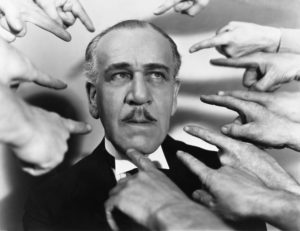by James Burns | Feb 1, 2018 | Attention, James Burns, The Bully Proof Classroom

The brain is a wonderful organ and it can be programmed by us and by others. The words that people say to us and the things that are done to us can produce a private logic that can either be believed or stricken from our conscious mind as being just or untrue. Your Reticular Activating System (RAS) is the automatic mechanism inside your brain that brings relevant information to your attention. The RAS is a filter between the conscious mind and the subconscious mind. Let’s say you are sitting in your classroom and in the distance, you hear sirens. Your subconscious mind may say, “police, fire, first aid.” You are busy concentrating on something else, so your conscious mind focuses on the task at hand. But, then you notice that the sirens were from a fire truck and the truck pulls in front of the school. Your RAS immediately kicks in and those sirens that you heard earlier are now relevant to you. If you start to smell smoke well, now it really has your attention. A student may come to school with his/her conscious mind already programmed. He/ she may have let so many negative thoughts in that they may have become part of his/her belief system. The student may have been bullied at home or punished for small mistakes. His/ her siblings may have picked on him/her to the point that his RAS now allows only negative thoughts in. But worse yet, he/ she now believes them. Negative words and treatment are the things that get his/her attention and they begin to form his/her self-image. His thoughts become actions. The order of the day is to create a climate in your classroom that is kind, caring, respectful, and responsible. Think about the best teacher you’ve ever had, and how he/she got your attention. Keep a smile on your face and do your best to provide an equitable distribution of your passion and understanding to all of your students. Maybe we have to realize what gets our attention and how good it feels when a smile comes our way.
Learn More
by James Burns | Jan 29, 2018 | James Burns, Principles, Spiritual Maturity, The Bully Proof Classroom

Self AcceptanceSpiritually mature people have learned how to like themselves and value the differences between themselves and others. They have an understanding that they were created in a unique way. They don’t wish for what they don’t have, and are grateful for the things that they do have. As a young man I often wondered why I had the parents I had. I often wished that they were different and even sometimes wished that I had a different set of parents. I often wondered why I was stuck with two sisters, and didn’t have a brother. Sometimes I thought about how I wished I was taller, had bigger bones, and was smarter. When I was about 30, I came to grips with the fact that some things in life are unchangeable. When my own children start to complain about me or their mother I usually say to them, “Sorry we’re the only game in town; you can’t trade us in for another set.”
Spiritually mature people accept who they are. They realize that they wouldn’t be on this earth if their parents didn’t bring them into the world, and they accept their individual features that make them who they are.
The Balance of Power
Spiritually mature people understand the balance of power. In other words they know who is in charge and why certain people are in charge. I heard a great talk on leadership once at an administrator’s conference in Washington, DC. The speaker made a statement that really stuck with me. His statement was, “In order to be a good leader you have to be a good follower first.” Spiritually mature people know how to follow orders and work in any system without moaning and groaning, and don’t making statements like, “Why do we have to do this?” or better yet, “Why is he/she doing this?” They also don’t talk about their bosses behind their back. It is human nature to wonder why someone is doing something. Spiritually mature people know how to go to their boss and discuss things face to face.
Why do spiritually mature people have this ability? I believe it’s because they really know who is in absolute charge, and that’s God. They know that God has placed this person in charge of them for a reason, and if they have a problem with their boss they might as well have a problem with God, and they don’t want to take that chance. They have learned how to separate the person from the position. They respect their boss’s position, but in their heart they know that they don’t always have to like who he/she is as a person. They know that God will honor their compliance, loyalty, and respect for the person in charge and they believe that they will be blessed beyond measure for being a good employee.
The Spiritually Mature People Can Forgive Others
Spiritually Mature people know how to forgive others. I battle this all the time. I know in my heart that I have to forgive others. I know that it is not good to hold a grudge. I say to myself you have to forgive, for your own good, you have to forgive. My problem comes in when I can’t forget. The longer I dwell on someone or something the angrier I become and ultimately I become bitter. This bitterness affects me and those around me. I will admit that this feeling can consume me at times. I might even look to get even with the person who I feel wronged me. Sometimes when I sleep I am told that I make statement like, “wait until you see what I’m going to do to these people.” Forgiveness is a sign of spiritual maturity. Lack of forgiveness can paralyze a person causing obsessive thoughts that impact a person’s ability to function on a day to day basis.
Spiritually mature people know that the object of their bitterness will be dealt with by God. They know how to forgive and forget. Sometimes they not only forget but they work to restore the relationship between themselves and others. They don’t allow themselves to fall into the trap of unforgiveness for a minute because they know that it is something that could impact them for a lifetime.
by James Burns | Jan 28, 2018 | Catholic Church, James Burns, Spiritual Maturity

Going to a Catholic Church and to a Catholic School were all an important part of my up bringing. My parents raised me as a Catholic and we went to church every Sunday. It didn’t matter if my parents had a brawl the night before, or even if they had a brawl on Sunday morning before church. We all got dressed up and walked over to St. Joseph Church like one happy family. I did learn something. I learned to believe in God, and all of the tenants of the Catholic faith. I learned what the Catholic Church called sin. The venial sins were the small ones, and the mortal sins were the big ones. I grew up believing that when God created Adam and Eve they were created as Catholics. I had a deep respect and still do for nuns and priests I watched as the nuns stopped wearing their traditional habits that all nuns wore at the time and tried to see how far above their knee they could wear their dresses. I know that the priests enjoyed watching this contest. I also had a great time talking to all the priests in school, in the community and in my fathers bar. Two of the priests were my father’s drinking buddies. They also attended AA meetings with my father. I received communion, got confirmed, went to confession, and then graduated from the eighth grade. That was the end of my religious experience.
My parents did what they could to provide a religious experience for me. The thing that they didn’t do was provide a spiritual experience. The religious experience that I had was one where I participated in the traditions of the Catholic Church. Most of the time I didn’t know why I did what I did; I just did it. The participation was confined to Sunday morning, and it didn’t really matter what happened during the other six days. I was never taught how to take the teachings of the faith and develop a set of spiritual principles that would become my value system as I grew older. I never really matured spiritually.
People usually turn to God for help when their foundations are shaking, only to learn that it is God who is shaking them. Sometimes God needs to do things to us to get our attention. The spiritually mature person doesn’t have to turn to God when things get tough, because they believe God is standing right next to them. They don’t scream Oh God, when they are fearful of life, they only have to whisper and they have the faith that He hears their words. Why do some people have this ability to be at peace even in the face of adversity, and tragedy? I don’t believe that spiritual maturity is something that just happens. A person doesn’t wake up one morning and find themselves with a renewed outlook on life. It is something that has to be cultivated from the bottom up. The roots have to be developed and then a person will begin to see the flowers. In my case I didn’t start this process until I was 30 years old. From the time I was about 17 years old I never could figure out what I believed in. I believed there was a God, but I didn’t have a value system or a commitment to any source that would help to inspire, or uplift me on a regular basis. Whenever a wave of life would hit me I would reach into the chambers of my soul and discover that there wasn’t anything there that I could use to help me deal with life’s problems. I never made the connection between spiritual maturity and overall maturity as a person. A spiritually mature person knows how to take the spiritual dimension and apply the principles of their belief system to their life on a daily basis. I have always enjoyed The Serenity Prayer. “God grant me the serenity to accept the things I cannot change, the courage to change the things I can, and the wisdom to know the difference.” In order for me to accept things and to develop wisdom I needed to plug into source to draw from and to gain daily inspiration. I found that the daily reading of the scriptures helped me gain insights into the battles of life and offered answers to questions that I otherwise never would have been able to come up with on my own. I would discover verses in scripture that I would meditate on and make them part of my prayer and thought life. The evangelist Martin Luther once said, “I have so much to do today, that I will have to spend two hours praying instead of one.” Scripture reading and prayer became a source for me to draw energy from, attain wisdom from, and to get the daily emotional strength I needed to manage my day.
Many people gain energy and insights from other areas. Inspirational literature, walks in the park, or even melodious music can inspire some. A fundamental belief system that gives a person a path to follow and that can make them almost unflappable and have inner peace is very private and very different for each person. There are certain core principles that spiritually mature people have adopted as a part of life. These principles are in the silent chambers of a person’s heart, and I believe that they are universal to everyone. When the ground starts to quake a person who has a strong core understands the reason for the earth quake and has the confidence that there is a way out.
by James Burns | Jan 27, 2018 | Anti Bullying Coaching and Resources, Bully Proof Classroom, James Burns

Independent people know how to do things on their own, and interdependent people know how to do things with the help of other people. Emotion-ally mature people know how to do both. They can function on their own but still understand that other people can be used as resources to help them solve some of life’s problems.
Parents are always concerned about sending their children off to live on their own. They start to worry around the time that their children get ready to go off to college. The biggest reason for the concern is because, in the parent’s’ minds, they feel that they didn’t teach their children enough to survive independent of them. The parents may have the desire to speak frequently on the phone with their children questioning them about their activities, their grades, who they’re hanging around with and even if they’re doing their school work.
This constant questioning is directly related to the parents’ uneasy feelings that they have about their children living away from home. This constant questioning will often be interpreted by the children as meddling and can even put a strain on their relationship with their parents. They may become so annoyed by their parents that they dread any conversation, and when they do talk to their parents it is only out of a basic obligation they believe they have.
Emotionally mature people understand the power of a positive relationship with their parents. People who are emotionally mature realize that they were once dependent on their parents for their care and for their needs. They want to become independent of their parents when they are teenagers and may end up in a few battles with their parents in their efforts to achieve a certain amount of independence. When they move into their late teens and early twenties, they realize that their parents are a powerful resource in their lives and that they still need their parents’ help to manage their lives as young adults. They talk to their parents frequently, ask their advice and work to involve them with the raising of their children. Emotionally mature people realize that the relationship that they have with their parents is really the first and probably the most important interdependent relationship that they will have in their lives.
In reality, the quality of the relationship that a person has with his or her parents will affect the quality of every other relationship that he or she will have in the future. In my case, I always had a problem dealing with my mother and couldn’t wait to get married so I could move out of my house to get away from her.
I was married when I was twenty four years old. I left my home and discovered that I was physically free and living an independent life on my own. The problem was that I wasn’t free emotionally. The inability on my part to form an interdependent relationship with my mother (my father had already passed away) left me riddled with guilt. That guilt affected every other relationship in my life. I never felt the freedom to ask my mother for help with anything, financial or otherwise. This attitude of mine of needing to do everything on my own and not needing people, including my mother, was not the very best for me.
In order to operate independently and interdependently, it is absolutely necessary to develop a positive relationship with our parent’s. Our parents should be our first and our best resource to help us understand how to work in an interdependent relationship. There are about seven billion people on the planet so the chances are really good that we will all be around people for the rest of our life. Some of these people will have personalities similar to our parents.
In order to work with others, a person has to learn how to work with the first two people in their life, their parents. There is no denying that our relationship with our parents is the first and most important interdependent relationship that a person will ever have.
by James Burns | Jan 26, 2018 | Criticism, James Burns, Principles, The Bully Proof Classroom

An emotionally mature person knows how to admit mistakes and can accept criticism with grace and humility. Emotionally mature people listen to criticism and ask themselves if what they are hearing is true. They do not get defensive or angry when someone doesn’t say what they want to hear. Often, the way a person is brought up plays a huge part in determining whether or not a they can handle criticism.
People who are placed on a pedestal when they are young will believe they can do no wrong and will have a difficult time when anyone criticizes them. At the other end of the spectrum, people who are raised in an environment where they were constantly criticized when they were young will also have a very tough time when anyone criticizes them. Often, people from both types of environments isolate themselves and ultimately have a real problem being around others for fear of hearing something that they don’t like.
I was brought up in a family where criticism was the rule, not the exception. My mother’s criticism had an extremely cruel edge to it as well. She was an expert at making each one of her children, including me, feel like a bad person. When I began my career as a teacher, I was twenty two years old. I was a special education teacher in a middle school in a inner city school in New Jersey. My class was made up of the toughest, most violent kids in the school. Their behavior was terrible and I had a tough time controlling the class. On one occasion very early in the school year, I was observed by the vice-principal. He came into my room unannounced and watched me teach for a full hour. My kids were not well behaved but I didn’t think they were as bad as they usually were.
About five days later, the vice-principal sat down with me to go over my performance evaluation. I was nervous since performance evaluations determined whether or not teachers get rehired.I knew very well that performance evaluations are designed to point out to the teacher some strength but mostly weaknesses that needed improvement. I knew I had to get myself ready for some criticism when during this conference. When the vice principal went over his findings with me, there wasn’t one positive remark in the evaluation. Every category was checked as either unsatisfactory or needs improvement. A mature reaction on my part would have been to engage my boss in a discussion so I could find out what he wanted me to do to improve. Instead, because of my knee-jerk reaction to any criticism whatsoever, my blood started to boil. I want you to understand that I knew my this was a fine administrator and a real gentleman. Knowing this, I should have realized that he was just doing his job and actually trying to help me. Unfortunately, that thought never entered my mind. Instead, I was having my immature, emotional reaction to him.
A day later, I went straight to the union representative and had him look at the evaluation. He immediately scheduled a meeting between himself, the principal, the vice principal and me. The principal of course supported the vice principal’s findings in the evaluation but he gave me a suggestion that actually leaked through my thick head. He told me to go over to another school and observe another class like mine and see if I could get some help. I scheduled time and went over to the other middle school in the district and started to observe a veteran teacher work with students who were as tough if not tougher than the students that I had in my class. This teacher had been in the district for many years and had developed so many effective techniques that he never really had any behavior problems. He was a kind, giving man and really took he under his wing. We became good friends. I learned from him and I became a better teacher.
The principal observed my classroom about four weeks later. This time there were positive things going on in my classroom. The kids being were pretty much on task and stayed in their seats. It actually looked like a classroom, not the circus. My new evaluation was great and assured me that my hard work was recognized. Even though I had had an immature reaction to the first performance evaluation, I had luckily listened to the one recommendation of the principal to visit another classroom. I started out very reactive but, with the help of others, finally realized there was a lot of truth in the criticism that had been included in that evaluation. It probably saved my job.
by James Burns | Jan 24, 2018 | Bully Proof Classroom, Character Qualities, Honesty, James Burns, Parents, Principles
John Bradshaw, the adult child of alcoholic guru, spoke this very telling comment about the truth. “Telling the truth prevents future pain.” Great principle. So why doesn’t everyone tell the truth? The answer is very simple. It takes a tremendous amount of emotional maturity to speak the truth. Often the truth can lead to a confrontation which is something a person who is emotionally immature can’t deal with.
this very telling comment about the truth. “Telling the truth prevents future pain.” Great principle. So why doesn’t everyone tell the truth? The answer is very simple. It takes a tremendous amount of emotional maturity to speak the truth. Often the truth can lead to a confrontation which is something a person who is emotionally immature can’t deal with.
Larry, a dear friend of mine, who unfortunately has passed away, watched me with my daughter one day. Anytime she did or said something that was wrong, I would have a huge reaction and start to yell at her about her behavior. Larry just kept observing this.
Finally he said to me, “Jim, by reacting the way you do, all you’re doing is grooming your daughter to be a good liar.” I finally understood what he meant when my daughter started to bend the truth a little. I would ask her a question and she would poke around verbally to try to find out what I wanted to hear. She did this to prevent my reaction. Emotionally mature people can speak the truth without fear of a reaction from another person, and can handle the truth when it is spoken to them.
In this country, we are so accustomed to dishonesty. One of our most popular presidents was most definitely an emotionally immature liar. In 1998, we watched as President Bill Clinton constantly deny his relationship with Monica Lewinsky. Why? Maybe he had a fear of an entire country and, of course, his wife Hilary’s reaction. When President Clinton continued to deny his affair, things only got worse for him as other women come flying out of the closet pronouncing that they also had affairs with the president. Clinton was also an expert in finding out what people wanted to hear and then he would tell them. People joked that he always agreed with the last person that he spoke with.






 this very telling comment about the truth. “Telling the truth prevents future pain.” Great principle. So why doesn’t everyone tell the truth? The answer is very simple. It takes a tremendous amount of emotional maturity to speak the truth. Often the truth can lead to a confrontation which is something a person who is emotionally immature can’t deal with.
this very telling comment about the truth. “Telling the truth prevents future pain.” Great principle. So why doesn’t everyone tell the truth? The answer is very simple. It takes a tremendous amount of emotional maturity to speak the truth. Often the truth can lead to a confrontation which is something a person who is emotionally immature can’t deal with.



